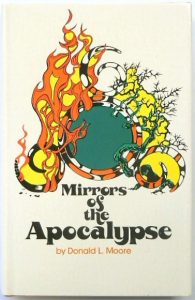MIRRORS OF THE APOCALYPSE by Donald L. Moore (BOOK REVIEW)
“We’ve been hearing a lot about how immortal we are […] but no one has been around long enough to prove it”
Donald L. Moore, author of ‘Mirrors of the Apocalypse’ remains a mystery to me. The book has no ‘author information’ or biography, and after scouring the web the only detail I can find is that Moore published his first and only novel in 1978, Mirrors of the Apocalypse.
Gleaned from the University of Liverpool’s book swap in the library, this 1978 master piece was an uncomfortable look at the future… humans technologise their bodies, weird cult religions have taken over in the guise of the ‘pharaoh’ and women are choosing immortality over having babies.
‘Building Utopias was exciting. Living in them was dull’
 I was surprised that such a random find was actually very enjoyable. It was disorientating to see the 70’s interpretation of speculative futures – considering longevity, sustainability, governance and technological innovations that are all relevant today.
I was surprised that such a random find was actually very enjoyable. It was disorientating to see the 70’s interpretation of speculative futures – considering longevity, sustainability, governance and technological innovations that are all relevant today.
Oliver Shandara, an academic of History, and Lucasta Flack, a medically certified grand dame, live together in a flat in Jerusalem. They live well, compared to many others, and generally they stay out of the politically fuelled and potentially dangerous activities of others. They focus on dining and enjoying life, meeting with friends and visiting the babies at ‘the Nest.’ Lucasta’s job, as a grand dame, marks her as a legal sex worker, who men can legally have sex with because she is no longer able to bare children. The idea in this society is that if men can have sex with a grand dame, then there will be less children – this is the idea of the Population Control Board. Immediately, red flags arise within this so called ‘utopia,’ and quickly, you realise things are not as might appear.
Lucasta ‘was registered with the Population Control Board as a “grand dame,” a medically certified barren woman. Her dogs were substitutes for the children she would never have’
If this novel was published more recently, I would have reported several allusions to other authors, instead I suppose Moore may have influenced many writers / been influenced in turn – depending on when works were published. So, for the purposes of ease, there are several texts with similarities that are worth mentioning. The protagonists journey from riches to rags, then from ignorance into enlightened about his reality reminded me of ‘The Giver,’ ‘1984,’ the protagonists character traits and historian occupation was reminiscent of ‘Children of Men,’ and Adrian Tchaikovsky’s ‘Children of Time,’ an occupation that during totalitarian control, is deemed obsolete or dangerous. Other reminders of Paolo Bacigalupi’s ‘PUMP SIX’ leaked through, concerning choosing apparent immortality over procreation, as well as some more details similarities to Adrian Tchaikovsky’s ‘Fire Walkers.’ Regardless of the number of similarities, this text is certainly unique, and tackles contemporary concerns with speculative genius.
“Despite the efforts of all the grand dames to control population, there seems to be no shortage of swollen bellies around.”
‘Women who still menstruated were required by law to refrain from a provocative appearance. This was part of the population control program. The post-menstrual dames were not to have competition.’
Cash-less society – this seems to be how things are going in 2023, with credit cards and ‘tap-and-go’ payments, banking apps and easy transfers, Vemo or paypal (and so on), many places have even gone ‘cashless,’ requiring payments by card or contactless phone payments. In the UK, the first contactless payments were established in 2007, but very few cards or card machines had the function to conduct contactless payments, by 2019 over 80% of debit and credit cards had the function, and now the majority or payments are made cashless (over 51%) and most businesses accept card payments. Very few are cash only. Moore acknowledges this concern over cashless-ness within his novel:
“The checking account was the first innovation to make paper money obsolete. After this came credit cards, and the EFTS – the Electronic Funds Transfer System […] The ultimate in convenience and safety was the wireless PFTS – Personalized Transfer of Funds System – which identified all parties to a transaction through the unique electrical impulses of their bodies, as identified by the marks on their foreheads and right hands”
Rather than working automatically – as contactless payments do – when one makes a payment using PFTS a literal banking computer must move the funds for you (!) there are countless bankers working through the billions of daily transactions, and should you pass beyond ‘radio range’ of one banker, you will be connected to the next one (a bit like jumping from wifi to wifi). Whilst this sounds like an overtly complicated process, for a speculative look at the future – his description isn’t that dissimilar to the reality of contactless, cashless payments. Moore goes a step further, and each individual is identified through their electrical impulse and the data stored in a symbol on their forehead. It would not be absurd to imagine one day having a chip, barcode or QR code printed within or on our bodies to conduct payments.
“We’re empty shells” “shadows of the people we were meant to be”
The entire novel is a haunting look at the future of humanity. Donald L. Moore speculatively acknowledged that humanities ever changing relationship with technology would ultimately become a ‘fatal reliance,’ human attitudes would augment and change, the worlds population would swell and the Earth would struggle. The planet would warm up and actions would be needed, whilst Mirrors of the Apocalypse use mirrors to harness energy and reflect energy, Donald L. Moore nods at the sustainable energy of the sun appears to understand that Solar Panels will one day be common place.
Moore does much within this obscure novel, of which I cannot find any reviews, opinions or other details. I do not even know if Moore is still amongst the living. But if you are curious about the Mirrors of the Apocalypse, as I was, I recommend you read this book…. Which is hard to find but can be obtained second hand:
Ebay ($10 plus shipping)
https://biblio.co.uk/9780820250014:99401777?dcx=99401777 (£10 plus shipping)
https://www.abebooks.co.uk/9780905947044/Mirrors-Apocalypse-MOORE-Donald-L-0905947045/plp (£7 – 10 plus shipping)
‘Immortality was hell on the next generation’

